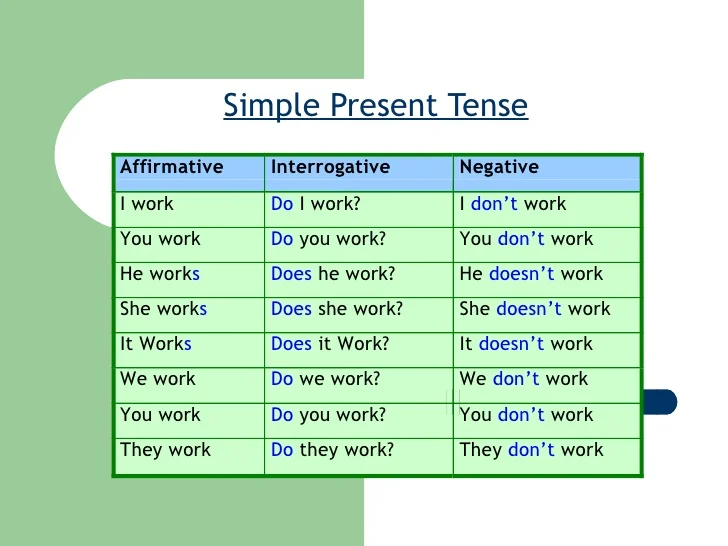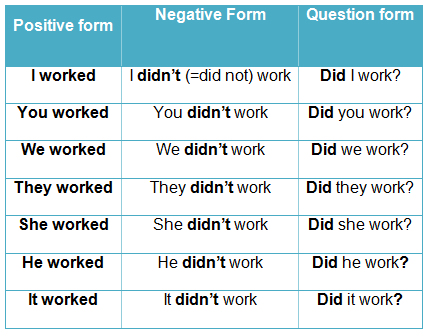|



Use of the Simple Present
1.1. repeated actions: My friend often draws nice posters.
1.2. things in general: The sun rises in the east.
1.3. fixed arrangements, scheduled events: The plane flies to London every Monday.
1.4. sequence of actions in the present: First I get up, then I have breakfast.
1.5. instructions : Open your books at page 34.
1.6. with special verbs: I understand English.
2. Signal words
- every day
- often
- always
- sometimes
- never
3. Form
infinitive (3rd person singular he, she, it: infinitive + -s)
4. Examples
4.1. Affirmative sentences in the Simple Present
| Long forms | Contracted forms |
|---|---|
| I read books. | not possible |
| You read books. | |
| He reads books. |
4.2. Negative sentences in the Simple Present
You must not negate a full verb in English. Always use the auxiliary do for negations and the infinitive of the verb.
| Long forms | Contracted forms |
|---|---|
| I do not clean the room. | I don't clean the room. |
| You do not clean the room. | You don't clean the room. |
| He does not clean the room. | He doesn't clean the room. |
4.3. Questions in the Simple Present
You need the auxiliary do/does and the infinitive of the verb.
| Long forms | Contracted forms |
|---|---|
| Do I play football? | not possible |
| Do you play football? | |
| Does he play football? |
Use of the Simple Past
1.1. action finished in the past: I visited Berlin last week.
1.2. series of completed actions in the past: First I got up, then I had breakfast.
1.3. together with the Past Progressive/Continuous – the Simple Past interrupted an action which was in progress in the past.
They were playing cards, when the telephone rang.
1st action → Past Progressive → were playing
2nd action → Simple Past → rang
2nd action → Simple Past → rang
2. Signal words
- yesterday
- last week
- a month ago
- in 2010
3. Form
4. Examples
4.1. Affirmative sentences in the Simple Past – regular verbs
| Long forms | Contracted forms |
|---|---|
| I cleaned my room. | not possible |
| You cleaned your room. | |
| He cleaned his room. |
4.2. Affirmative sentences in the Simple Past – irregular verbs
| Long forms | Contracted forms |
|---|---|
| I went home. | not possible |
| You went home. | |
| He went home. |
4.3. Negative sentences in the Simple Past
Do not negate a main verb in English. Always use the auxiliary did (Simple Past of to do) and the infinitiveof the verb for negations.
There is no difference between regular and irregular verbs in negative sentences.
| Long forms | Contracted forms |
|---|---|
| I did not clean the room. | I didn't clean the room. |
| You did not clean the room. | You didn't clean the room. |
| He did not clean the room. | He didn't clean the room. |
4.4. Questions in the Simple Past
You need the auxiliary did and the infinitive of the verb.
| Long forms | Contracted forms |
|---|---|
| Did I play football? | not possible |
| Did you play football? | |
| Did he play football? |
Exercises on Simple Present vs Simple Past
- Study this PDF
- Simple past tense
- Simple past tense - Test Nº 1
- Simple past tense - Test Nº 2
- Simple present tense - Test Nº 1
- Simple present tense - Test Nº 2
- Simple present tense - Test Nº 3
Remember:



Grammar on Simple Present vs Simple Past
More exercises

No comments:
Post a Comment